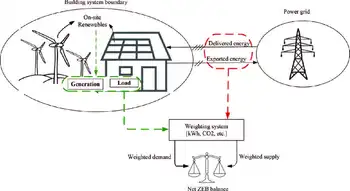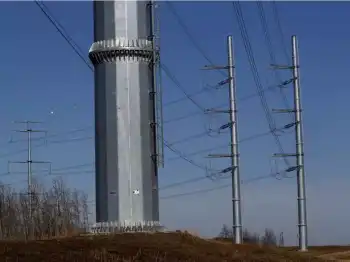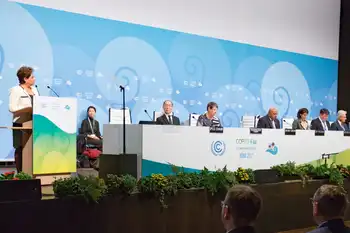Utility's six Illinois sites release too much soot, U.S. says
By Knight Ridder Tribune
Protective Relay Training - Basic
Our customized live online or in‑person group training can be delivered to your staff at your location.

- Live Online
- 12 hours Instructor-led
- Group Training Available
In documents made public recently, the U.S. Environmental Protection Agency accused Midwest Generation of extending the life of its aging power plants, including five in Chicago and the suburbs, without installing pollution controls required under the Clean Air Act. The agency also cited the company, a subsidiary of California-based Edison International, with releasing too much soot, or microscopic air pollution that can trigger asthma attacks and cause lung disease, heart problems and early deaths.
Coal plants are major sources of soot and other forms of air pollution that combine to create smog, which lingers over the Chicago area during the summer.
But older plants like those owned by Midwest Generation, most of which were built in the 1940s and 1950s, were exempted for years from pollution laws. Regulators gradually realized many of these older plants had been updated, modified and expanded so many times that they should be considered new plants and forced to comply with tough pollution standards.
Several companies around the nation have settled federal lawsuits by agreeing to spend millions on new pollution controls. Environmental groups have been urging the EPA for more than a decade to take similar action against the Chicago-area power plants.
"This is long overdue but very welcome news," said Bruce Nilles, director of the Sierra Club's Midwest Clean Air Campaign. Midwest Generation owns two coal plants in Chicago (in Pilsen and Little Village), two in Will County (in Joliet and Romeoville), one in Waukegan and one outside Peoria. All of the power plants formerly were owned by ComEd, which also is cited in the federal complaint. The current owners noted they already have cut a deal with Gov. Rod Blagojevich's administration to dramatically clean up the coal plants by 2018 or close them. The federal complaint is a separate action that could force Midwest Generation to upgrade its plants faster.
"We have a long-range compliance plan to address the issues raised by the EPA," said Doug McFarlan, a company spokesman. A ComEd spokeswoman, meanwhile, said the utility is reviewing the complaint but stressed that it sold the coal plants years ago. Illinois ratepayers won't absorb Midwest Generation's costs to settle either the federal complaint or the state agreement because the company sells electricity on the open market, rather than to a defined service area like ComEd.
Dated July 31, the complaint comes two years after Illinois Atty. Gen. Lisa Madigan wrote a scathing letter to state regulators documenting more than 7,600 pollution violations at the six power plants since 1999, the year Midwest Generation bought them from ComEd.
At the time, the Illinois EPA agreed with Midwest Generation executives who argued that occasional bursts of soot from the plants were normal and nothing to worry about. Federal regulators also declined to get involved, though they later cited the Blommer Chocolate factory in the West Loop with similar violations involving cocoa powder pollution.
The Chicago area has suffered from chronic dirty-air problems for years. Monitoring data indicates Cook County and surrounding counties have violated the federal standard for ground-level ozone, or smog, on eight days since May 22. On August 8, air pollution was so bad that the region exceeded limits for both smog and soot.
In a recent interview, top officials in the EPA's Chicago office said they have been investigating the Midwest Generation plants since 2003. The agency demanded information about construction and maintenance projects dating to when ComEd owned the plants. But the EPA blacked out the details in the public version of its complaint after Midwest Generation and ComEd said they involved confidential business information.
"It took us some time to process and analyze this information," said George Czerniak, chief of the EPA's regional air-enforcement branch. Midwest Generation officials now will be called into the EPA's offices to discuss the case.
Mary Gade, the agency's regional administrator, formerly worked for a law firm that represented the company and has recused herself from any involvement, a spokeswoman said. Critics wondered about the timing of the complaint. Madigan and environmental groups have argued that the pollution problems should have been addressed last year, before state and federal regulators awarded Midwest Generation a new permit for the coal plants. The allegations against the company involve a provision of the Clean Air Act known as New Source Review, which requires power plants to be retrofitted with pollution controls if they undergo major modifications.
Bush administration officials have tried several times to rewrite the law to make it easier for utilities to upgrade aging coal plants. They continued to pursue a handful of lawsuits against polluters that were filed by the Clinton administration but generally have shied away from filing new cases. In December, Midwest Generation agreed to make deep cuts in smog, soot and mercury pollution from the six plants by 2018.
It also raised the possibility of shutting down the Pilsen, Little Village and Waukegan plants if improving them proves too expensive. Brokered by the Blagojevich administration, the deal promises steady improvements in air quality throughout the Chicago area.
But environmental groups grumbled that it gave Midwest Generation too long to meet tougher limits. "We never thought the federal EPA would step up to the plate and do what's right," said Ann Alexander, a senior attorney at the Natural Resources Defense Council, who formerly worked as Madigan's top assistant for environmental issues. "But Midwest Gen needed more pressure to clean up and this might provide that pressure."











